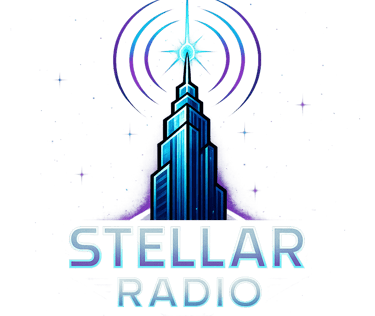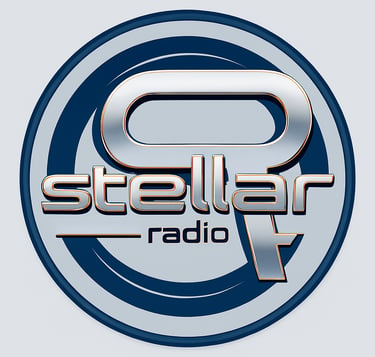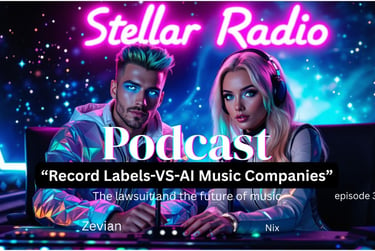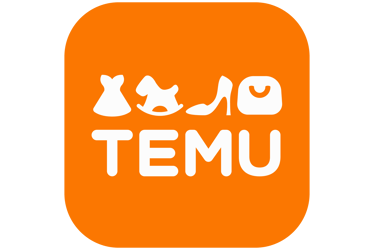The Record Labels vs. AI Music Industry: Who’s Really on Trial?
AI MUSIC
Stellar Radio
6/6/20254 min read


The Record Labels vs. AI Music Industry: Who’s Really on Trial?
The music world is buzzing with debate as record labels take legal action against AI music companies. At first glance, it might seem like a classic battle: old-guard industry giants versus disruptive new technology. But as with most things in music and tech, the story is far more complex—and the implications reach much further than most headlines suggest.
The Lawsuit: What’s at Stake? Major record labels argue that AI music companies are using copyrighted material to train their models, potentially infringing on the rights of artists and songwriters. The AI companies, on the other hand, claim they’re innovating and democratizing music creation, opening doors for new voices and creative possibilities. But beneath the surface, there are questions that don’t always make it into the mainstream conversation.
Record Labels: Protectors or Gatekeepers? Record labels say they’re fighting to protect their artists’ intellectual property. That’s a valid concern—after all, artists deserve to be compensated for their work. But here’s something many people don’t realize: the same record labels suing AI companies have also invested heavily in AI themselves. Some of the world’s biggest music companies are quietly building their own AI tools, and a significant percentage of their signed artists are already using AI in their creative process. So, are the labels defending their artists, or are they trying to control who gets to use these powerful new tools? Is this about protecting creativity, or about maintaining a profitable status quo?
The Artists: Caught in the Middle Many artists are excited about AI’s potential. AI can help with songwriting, production, and even marketing. But there’s a catch: if an artist uses an AI tool that’s later found to have infringed on copyrights, could the artist themselves be held liable? The legal landscape is still evolving, and content creators—whether independent or signed—may find themselves in uncharted territory.
The Content Creators: New Risks, New Opportunities If you’re a musician or producer using AI music services, you might be wondering: am I at risk? The answer isn’t clear yet. Some legal experts warn that users of AI-generated music could be swept up in lawsuits, especially if the AI was trained on copyrighted material without permission. Others argue that fair use and transformative work doctrines might offer some protection. The Bigger Picture: Who Gets to Use AI? Perhaps the most important question is this: should access to AI music tools be limited to those with the deepest pockets, or should everyone have a chance to experiment and create? If record labels win these lawsuits, will they open up their own AI tools to the public—or keep them behind closed doors to maximize profits?
Conclusion: So, is this lawsuit about protecting the artists? The battle between record labels and AI music companies isn’t just about copyright law. It’s about who gets to shape the future of music, who gets to profit, and who gets left out. As the lawsuits unfold, it’s worth asking: are we protecting artists, or just protecting old business models? And what does real creativity look like in the age of AI? What do you think? Is this a fight for fairness, or a struggle for control? If you want to hear more, check out our short podcast discussions on Rumble.
Final Thoughts: As a content creator who uses AI to make music—and as a passionate fan of music and many artists—I genuinely care about artists not getting hurt financially because of this technology. i wonder what artists like Prince would think. would he side with the record labels or the open use of the technology?
I know from experience that creating a truly great song isn’t just about typing in a prompt like “make me a good song.” It often takes hours, days, or even weeks of effort to craft something that aligns with what you have in mind. When I first heard about the lawsuit between the Recording Industry and the AI Music Industry, I was initially disappointed, thinking I might have to take down some of my own work but ready to do what was right. But then I learned that record labels have heavily invested in AI music generators, and some of their artists even use this technology. The AI music generator I use will not allow users to input prompts like “make a song that sounds like Taylor Swift,” because it simply won’t let you. It will give you an error and a warning. Even if the lawsuit favors the record labels, I believe this restriction should remain for all AI music tools. They weren’t trained to mimic individual artists—they’re trained on the structure of music, genres, and broader patterns, not specific personalities or voices. If someone tries to prompt the AI to sound like a particular artist, they’re likely still pushing into copyright infringement territory.
I love this technology, and I truly believe AI is here to stay. But one thing’s for sure—AI can’t get on stage and entertain a crowd. That’s something only real artists can do, and I have the utmost respect for their craft. So, let's continue to support our favorite artists.
Plays On Rumble
Remove the middleman and you have the most popular products at the best prices!







